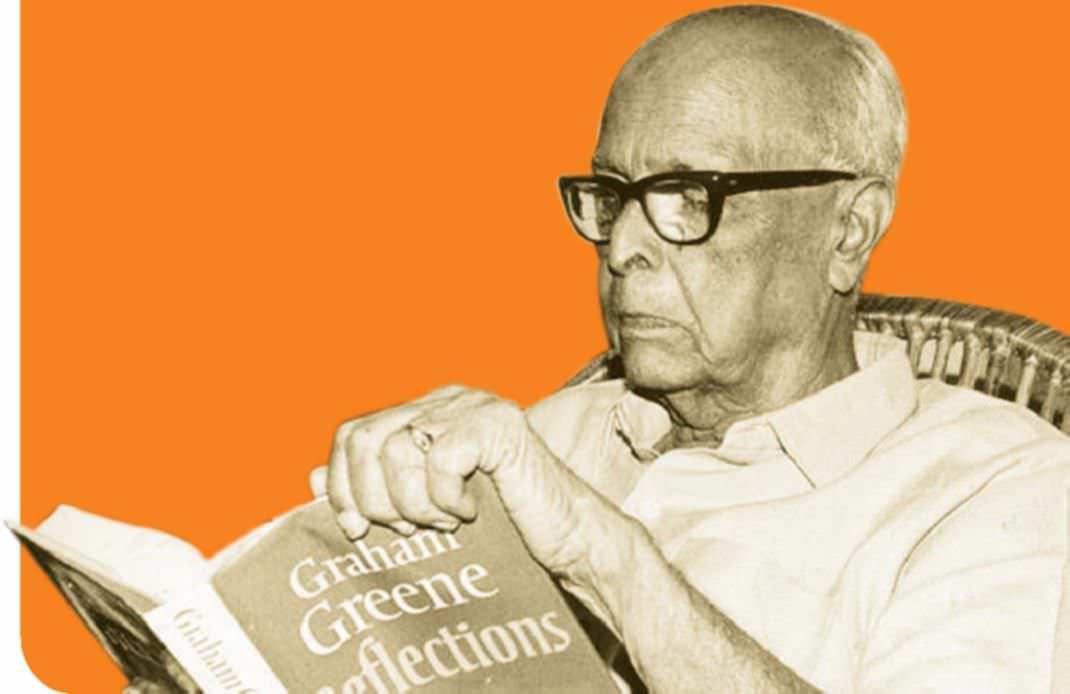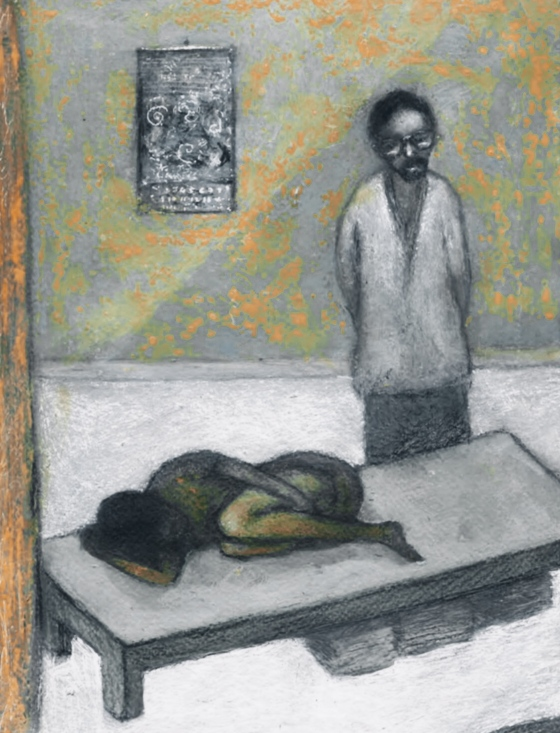Father's Help
R. K. Narayan
WBBSE: ENGLISH: CLASS-X
Table of Contents
About The Author
About The Story
Characters In The Story
UNITWISE FULL TEXT
Unit 1
Unit 2
Unit 3
Important Word-notes
What We Learn From The Story
About the Author
R. K. Narayan [1906-2001]
Rasipuram Krishnaswami Iyer Narayanaswami [10 October 1906 --- 13 May 2001], a major leading figure in early Indian English literature, is popularly known as R. K. Narayan. He is a famous Indian writer in English who wrote his writings in simple and lucid language. He is known for his work set in the fictional South Indian town of Malgudi. In a writing career that spanned over sixty years, Narayan authored fifteen novels, five collections of short-stories, two travel books, two volumes of essays, a volume of memoirs, and retellings of the Ramayana and Mahabharata. His famous works include 'Swami and Friends [1935], 'The English Teacher [1945], 'The Guide [1958], The Bachelor of Arts [1937]. In 1958 his novel 'The Guide' won him the Sahitya Akademi Award, India's highest literary honour. Credited with bringing Indian literature in English to the rest of the world, Narayan received the prestigious Padma Vibhushan, India's second-highest civilian award, and was also nominated to the Rajya Sabha in 1989.
लेखक के बारे में
R. K. Narayan [1906-2001]
रासीपुरम कृष्णस्वामी अय्यर नारायणस्वामी [10 अक्टूबर 1906 --- 13 मई 2001], प्रारंभिक भारतीय अंग्रेजी साहित्य में एक प्रमुख अग्रणी व्यक्ति, आर के नारायण के नाम से लोकप्रिय हैं। वह अंग्रेजी में एक प्रसिद्ध भारतीय लेखक हैं जिन्होंने अपने लेखन को सरल और स्पष्ट भाषा में लिखा है। उन्हें काल्पनिक दक्षिण भारतीय शहर मालगुडी में स्थापित उनके काम के लिए जाना जाता है। साठ वर्षों से अधिक समय तक फैले अपने लेखन करियर में, नारायण ने पंद्रह उपन्यास, लघु-कहानियों के पांच संग्रह, दो यात्रा पुस्तकें, निबंधों के दो खंड, संस्मरणों का एक खंड, और रामायण और महाभारत की पुनर्कथाएं लिखीं। उनकी प्रसिद्ध रचनाओं में 'स्वामी एंड फ्रेंड्स [1935],' द इंग्लिश टीचर [1945], 'द गाइड [1958], द बैचलर ऑफ आर्ट्स [1937] शामिल हैं। 1958 में उनके उपन्यास 'द गाइड' ने उन्हें साहित्य अकादमी पुरस्कार, भारत का सर्वोच्च साहित्यिक सम्मान दिलाया। अंग्रेजी में भारतीय साहित्य को दुनिया के बाकी हिस्सों में लाने का श्रेय, नारायण को प्रतिष्ठित पद्म विभूषण, भारत का दूसरा सबसे बड़ा नागरिक पुरस्कार मिला, और 1989 में राज्यसभा के लिए भी नामित किया गया था।
About The Story
'Father's Help' is one of R. K. Narayan's most popular short-stories from his famous collection 'Malgudi Days'. In this story R. K. Narayan presents a young boy called Swaminathan who is unwilling to go to school, but he is forced by his strict father to attend school. The story explains how, through the events that follow, Swami's original reservations about his teacher, Samuel, get transformed considerably.
कहानी के बारे में
'फादर हेल्प' आर के नारायण के प्रसिद्ध संग्रह 'मालगुडी डेज़' की सबसे लोकप्रिय लघु-कथाओं में से एक है। इस कहानी में आर के नारायण स्वामीनाथन नामक एक युवा लड़के को प्रस्तुत करते हैं जो स्कूल जाने के लिए तैयार नहीं है, लेकिन उसे अपने सख्त पिता द्वारा स्कूल जाने के लिए मजबूर किया जाता है। यह कहानी बताती है कि कैसे, आगे आने वाली घटनाओं के माध्यम से, अपने शिक्षक सैमुअल के बारे में स्वामी की मूल शंकाएं काफी हद तक बदल जाती हैं।
Characters In The Story
Swaminathan
In the story Swaminathan, in short Swami, is a young boy who is unwilling to go to school, but is forced to attend school by his strict father.
Swaminathan's Father
He is a very strict man who wants Swaminathan to attend school regularly.
Swaminathan's Mother
She is a generous woman. As soon as she knows about Swami's headache, she suggests that Swami may stay home today.
Samuel
He is a mathematics teacher in Swami's school. He is a good teacher who is much more friendly than the other teachers. But at the beginning of the story Swaminathan reports to his father that he is a very angry man who becomes angry with the boys who come in late in class.
Headmaster
The headmaster in Swami's school, according to Swami, even is afraid of Samuel sir.
Peon
The peon in Swami's school informs Swami that the headmaster is on a week's leave.
स्वामीनाथन
कहानी में स्वामीनाथन, संक्षेप में स्वामी, एक युवा लड़का है जो स्कूल जाने को तैयार नहीं है, लेकिन अपने सख्त पिता द्वारा स्कूल जाने के लिए मजबूर किया जाता है।
स्वामीनाथन के पिता
वह बहुत सख्त आदमी है जो चाहता है कि स्वामीनाथन नियमित रूप से स्कूल जाए।
स्वामीनाथन की माँ
वह एक उदार महिला हैं। जैसे ही वह स्वामी के सिरदर्द के बारे में जानती है, वह सुझाव देती है कि स्वामी आज घर पर रहें।
शमूएल
वह स्वामी के स्कूल में गणित के शिक्षक हैं। वह एक अच्छा शिक्षक है जो अन्य शिक्षकों की तुलना में बहुत अधिक मिलनसार है। लेकिन कहानी की शुरुआत में स्वामीनाथन अपने पिता को बताता है कि वह बहुत गुस्सैल आदमी है जो कक्षा में देर से आने वाले लड़कों से नाराज़ हो जाता है।
स्कूल का संचालक
स्वामी के स्कूल के प्रधानाध्यापक, स्वामी के अनुसार, सैमुअल सर से भी डरते हैं।
चपरासी
स्वामी के स्कूल में चपरासी ने स्वामी को सूचित किया कि प्रधानाध्यापक एक सप्ताह की छुट्टी पर हैं।
UNITWISE FULL TEXT
Unit 1
Lying in bed, Swami realized with a shudder that it was Monday morning. It looked as though only a moment ago it was Friday. Already Monday was here. He hoped he didn't have to go to school. At nine o'clock, Swaminathan wailed, "I have a headache."
Swami's complaining about headache
Mother generously suggested that Swami might stay at home. At 9.30, when he ought to have been in the school prayer hall, Swami was lying on the bench in Mother's room.Swami's lying and his father's asking him to go to school
Father asked him, "Have you no school today?"
"Headache," Swami replied.
"Nonsense! Dress up and go."
"Headache!"
"Loaf about less on Sundays and you will be without a headache on Monday."
Swami knew how strict his father could be. So he changed his tactics. "I can't go so late to the class."
"You'll have to. It is your own fault."
"What will the teacher think if I go so late?"
"Tell him you had a headache and so are late."
"He will scold me if I say so."
"Will he? Let us see. What is his name?"
"Samuel."
"Does he always scold the students?"
"He is a very angry man. He is especially angry with boys who come in late. I wouldn't like to go late to Samuel's class."
"If he is so angry, why not tell your headmaster about it?"
"They say that even the headmaster is afraid of him."
यूनिट 1
बिस्तर पर लेटे स्वामी ने सिहरन के साथ महसूस किया कि यह सोमवार की सुबह थी। ऐसा लग रहा था मानो अभी कुछ देर पहले ही शुक्रवार का दिन हो। पहले से ही सोमवार यहाँ था। उसे उम्मीद थी कि उसे स्कूल नहीं जाना पड़ेगा। नौ बजे स्वामीनाथन चिल्लाया, "मेरे सिर में दर्द है।"
माँ ने उदारतापूर्वक सुझाव दिया कि स्वामी को घर पर ही रहना चाहिए। 9.30 बजे, जब उन्हें स्कूल के प्रार्थना कक्ष में होना चाहिए था, तब स्वामी माँ के कमरे में बेंच पर लेटे हुए थे।
स्वामी का झूठ बोलना और उसके पिता का उसे स्कूल जाने के लिए कहना
पिता ने उससे पूछा, "क्या आज तुम्हारा स्कूल नहीं है?"
"सिरदर्द," स्वामी ने उत्तर दिया।
"बकवास! पोशाक पहनो और जाओ।"
"सिरदर्द!"
"रविवार के दिन थोड़ा कम खाएं और सोमवार को आप बिना सिर दर्द के रहेंगे।"
स्वामी जानते थे कि उनके पिता कितने सख्त हो सकते हैं। इसलिए उसने अपनी रणनीति बदल दी। "मैं कक्षा में इतनी देर से नहीं जा सकता।"
"आपको करना होगा। यह आपकी अपनी गलती है।"
"अगर मैं इतनी देर से जाऊँगा तो शिक्षक क्या सोचेंगे?"
"उसे बताओ कि तुम्हारे सिर में दर्द था और इसलिए देर हो गई।"
"अगर मैं ऐसा कहूँगा तो वह मुझे डाँटेगा।"
"क्या वह करेगा? आइए देखें। उसका नाम क्या है?"
"सैमुअल।"
"क्या वह हमेशा छात्रों को डाँटता है?"
"वह बहुत गुस्सैल आदमी है। वह विशेष रूप से उन लड़कों से नाराज़ है जो देर से आते हैं। मैं सैमुअल की कक्षा में देर से नहीं जाना चाहता।"
"अगर वह इतने गुस्से में हैं, तो अपने हेडमास्टर को इसके बारे में क्यों नहीं बताते?"
"वे कहते हैं कि प्रधानाध्यापक भी उससे डरते हैं।"
Important Word-notes :
shudder (v.) : shiver, as from cold, but here from fear
as though (conj.) : as if, like
moment (n.) : a particular point in time
wailed (v. p. of wail) : cried loudly
headache (n.) : pain in the head due to some causes
generously (adv.) : benevolently, liberally
suggested (v. p. of suggest): proposed, advised
might (v. p. of may) : expressed possibility
stay (v.) : remaining in a place or state
ought to (v.) : should
prayer hall (n.) : a large room for performing supplication, prayer
nonsense (n.) : statements or beliefs that are untrue or make no sense; rubbish;meaninglessness
dress up (v.) : put on special clothes; get dressed
loaf (v.) : spend or waste time by loitering around idly in doing little
less (adv.) : little, slight
strict (adj.) : rigorous, self-disciplined
tactics (n. pl. of tactic) : plans for attaining a particular goal
fault (n.) : error, mistake, flaw, defect
scold (v.) : chide, rebuke
especially (adv.) : particularly
afraid (adj.) : filled with fear or apprehension
Unit 2
Swami hoped that with this his father would be made to see why he must avoid school for the day. But Father's behaviour took an unexpected turn. He proposed to send a letter with Swami to the headmaster. No amount of protest from Swami would make him change his mind.
Father's sending a letter with Swami to the headmaster and Swami's apprehension
By the time Swami was ready to leave for school, Father had composed a long letter to the
headmaster. He put it in an envelope and sealed it. "What have you written, Father?" Swami asked apprehensively.
"Nothing for you. Give it to your headmaster and go to your class." "Have you written anything about our teacher Samuel?"
"Yes. Plenty of things."
"What has he done, Father?"
"Everything is there in the letter. Give it to your headmaster." Swami went to school feeling that he was the worst boy on earth. His conscience bothered him. He wasn't at all sure if his description of Samuel had been accurate. He felt he had mixed up the real and the imagined.
Swami stopped on the roadside to make up his mind about Samuel. Samuel was not such a bad man after all. Personally he was much more friendly than the other teachers. Swami also felt Samuel had a special regard for him.
Swami's head was dizzy with confusion. He could not decide if Samuel really deserved the
allegations made against him in the letter.
Swami's sorrowful thinking of Samuel sir
pre he thought of Samuel, the more Swami grieved for him. To recall Samuel's dark face, his thin moustache, unshaven cheek and yellow coat filled Swaminathan with sorrow.
Important Word-notes
avoid (v.) : stay away from
behaviour (n.) : mannar or conduct of acting or controlling ownself
unexpected turn (participle adj. & n.): not expected or anticipated turn
proposed (v. p. of propose) : suggested, advised
protest (n.) : complaint, objection
by the time (adv. phrase) : used for saying what has already happened
composed (v. p. of compose) : wrote
envelope (n.) : a flat container for a letter
sealed (v. p. of seal) : closed up
apprehensively (adv.) : anxiously, uneasily
plenty (adv.) : as much as necessary; enough
worst (adj.) : (superlative of 'bad') inferior
conscience (n.) : moral sense
bothered (v. p. of bother) : pricked; troubled; annoyed
accurate (adj.) : exact; precise
make up (group or phrasal v.) : devise; settle
personally (adv.) : as yourself
friendly (adj.) : amiable; amicable
special (adj.) : unique or specific to a person or thing or category
regard (n.) : respect; attentiveness
dizzy (adj.) : giddy; woozy
confusion (n.) : disorder resulting from a failure to behave predictably
decide (v.) : determine, resolve, make up one's mind
really (adv.) : truly; genuinely; actually
deserved (v. p. of deserve) : to be worthy of
allegations (n. pl. of allegation) : allegements
grieved (v. p. of grieve) : felt grief
recall (v.) : call up; remember
Unit 3
As he entered the school gate, an idea occurred to him. He would deliver the letter to the headmaster at the end of the day. There was a chance Samuel might do something during the course of the day to justify the letter.
Swami stood at the entrance to his class. Samuel was teaching arithmetic.
Samuel's looking at Swami during his arithmetic class
He looked at Swami. Swami hoped Samuel would scold him severely. "You're half an hour late," Samuel said.
"I have a headache, Sir," Swami said.
"Then why did you come at all?"
This was an unexpected question from Samuel.
Swami said, "My father said I shouldn't miss school, sir." Samuel looked impressed. "Your father is quite right. We want more parents like him." "Oh, you poor man! "Swami thought, "You don't know what my father has done to you."
"All right, go to your seat."
Swami sat down, feeling sad. He had never met anyone as good as Samuel. The teacher was inspecting the home lessons. To Swami's thinking, this was the time when Samuel got most angry. But today Samuel appeared very gentle.
"Swaminathan, where is your homework?" "I have not done my homework, sir," Swami said.
"Why---headache?" asked Samuel.
"Yes, sir."
"All right, sit down," Samuel said.
When the bell rang for the last period at 4.30, Swami picked up his books and ran to the headmaster's room. He found the room locked. The peon told him the headmaster had gone on a week's leave.
HEADMASTER
Peon's telling about headmaster's leave to Swami
Swaminathan ran away from the place.
As soon as he entered home with the letter, Father said, "I knew you wouldn't deliver it. "But the headmaster is on leave," Swami said.
Father snatched the letter away from Swami and tore it up.
"Don't ever come to me for help if Samuel scolds you again. You deserve your Samuel," he said.
Important Word-notes :
as (conj.) : when
idea (n.) : thought
occurred (v. p. of occur) : took place; came about; happened
deliver (v.) : hand over
chance (n.) : opportunity
during (prep.) : at some time in the duration of
justify (v.) : show to be right by providing justification or proof
entrance (n.) : entryway
arithmetic (n.) : the branch of pure mathematics dealing with the theory of numerical calculations
severely (adv.) : badly; gravely
unexpected (participle adj.) : not expected or anticipated
miss (v.) : fail to reach or get to on time
impressed (adj.) : favorably influenced
quite (adv.) : absolutely; completely
inspecting (v. progressive of inspect): looking over or examining carefully for accuracy with the intent of verification
home lessons (n. pl. of home lesson): home tasks
most angry (adv. & adj.) : showing anger in a great extent
appeared (v. p. of appear) : looked; seemed
very gentle (adv. & adj.) : soft or docile in a great extent
homework (n.) : preparatory school work done outside school
rang (v. p. of ring) : sounded loudly or sonorously
leave (n.) : leave of absence
ran away (group or phrasal v. p. of run away): fled
as soon as (adv.) : immediately at or shortly after the time that
snatched away (v. p. of snatch away): to take something or someone away by force
tore up (v. p. of tear up) : to destroy something such as a piece of paper or cloth by pulling it into pieces
deserve (v.) : be worthy of or entitled














.jpg)
No comments:
Post a Comment